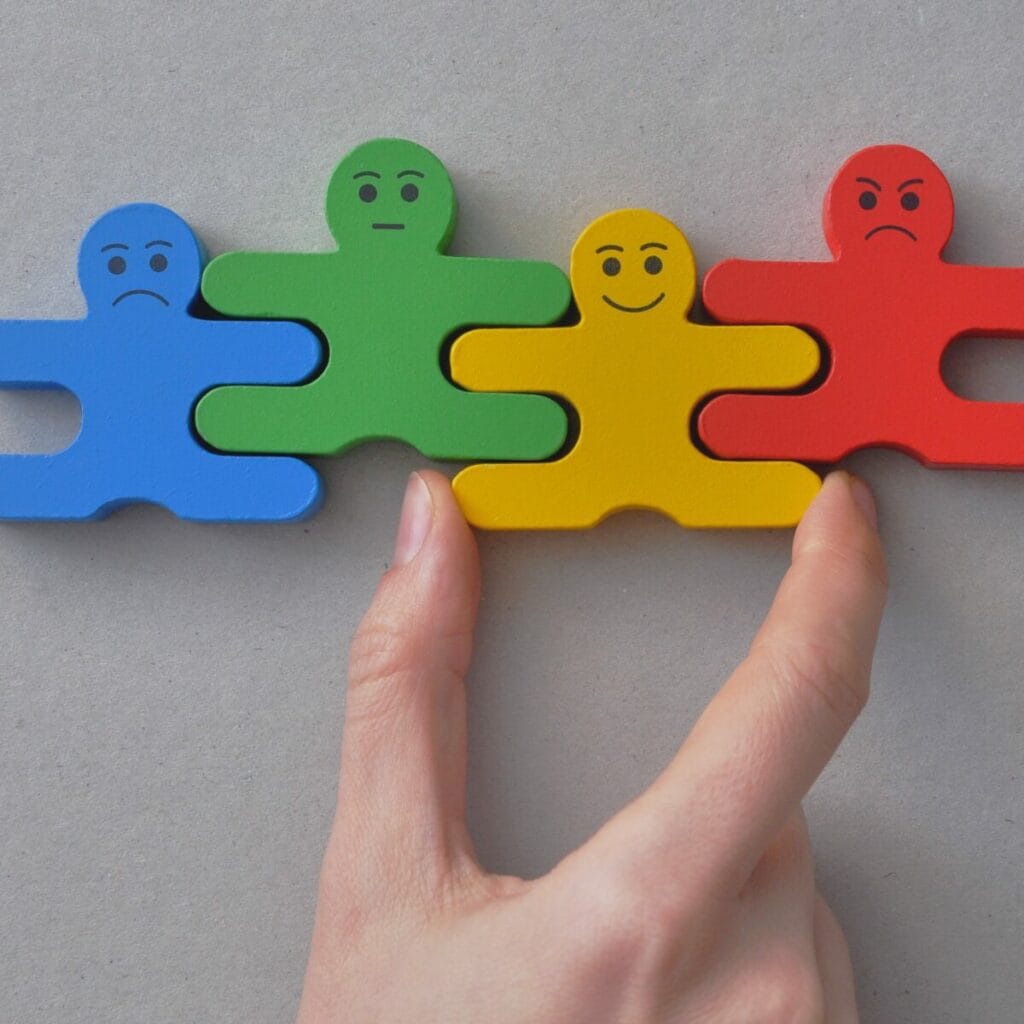10 cognitive distortions that are ruining your life: how to stop them fast by observing your words and adopting these 5 micro-habits.
“We don’t see things as they are, we see them as we are.” – Anaïs Nin
Cognitive distortions are those irrational thoughts that influence your perception of the world, your emotions and ultimately your actions. Often automatic and unconscious, these thinking errors can ruin your life. They sabotage self-esteem, fuel anxiety, and hinder interpersonal relationships.
We are all victims of cognitive distortions. Have you ever thought you did a bad job, only to discover you did a great job? Maybe you thought: ‘Impossible! I know I did terrible. Luckily they didn’t notice. This is a classic example of cognitive distortion.
But there is good news. You can learn to get rid of these cognitive distortions. The first step is to recognise and understand the most common thinking errors.
In this article, you will discover 10 cognitive distortions, with concrete examples and keywords that will help you identify and stop these harmful thinking patterns. If you are interested in the prospect of learning how to transform your thoughts from enemies to allies, you are in the right place.
Disclaimer: The information provided in this article is for informational purposes only and does not constitute medical advice. If you are facing mental health problems, it is strongly recommended that you immediately consult a doctor or qualified specialist for an individual assessment and treatment.

What are cognitive distortions?
“I never get one right”. “I am a failure”. “No one is interested in what I have to say”. “He only says it to please me, he doesn’t mean it”. “He didn’t reply to my message, he must be angry with me”. “I am an idiot”. “I will lose my job because of this mistake”.
Do you recognise yourself in these sentences? These are just a few examples of cognitive distortions that often lodge in our minds.
Are you sure that the narratives you tell yourself, your inner monologues, are your allies? Or are they rather obstacles to serenity? And above all, are you sure that the things you tell yourself are true? As we will now see, cognitive behavioural psychology suggests that this is often not the case.
Why learn how to stop cognitive distortions?
Beck’s Cognitive Distortions are distorted thought patterns identified and studied by psychologist Aaron T. Beck, known for his seminal work in cognitive therapy. These distortions are systematic errors in the way we interpret reality that affect our emotions, our behaviour and our lives.
Aaron T. Beck has identified more than 10 common cognitive distortions, each with its own distorted thought pattern. These distortions are often automatic and unconscious, and can cause anxiety, depression, stress and other emotional problems.
Recognising and understanding Beck’s cognitive distortions is a basic principle of cognitive psychotherapy, as it allows you to identify and address the distorted thoughts that contribute to your unhappiness. When you become aware of your thoughts you also learn to manage your emotions better, become more resilient and live a more peaceful life.
If you would like to learn more about this topic and learn how to manage your thoughts in a more positive way, we also recommend reading our article “How to Harness the Power of Thoughts: 10 Surprising Ways”. Continue reading to discover Beck’s 10 cognitive distortions, complete with examples and key words to recognise and deal with them in your life.
10 Cognitive Distortions to Stop
1. All-or-nothing thinking
Have you ever thought you were a total failure just because something went wrong? This is all-or-nothing thinking. This distortion leads you to overlook past successes and focus only on extremes. Perceiving situations in extremes means reducing everything to a dichotomy of all and nothing, black and white, without allowing for nuances or intermediate possibilities.
Example: You are on a diet and you had a breakdown. “I ruined everything by eating a sandwich today. It’s impossible, I’ll never make it. I might as well give up now and go back to my old habits’.
Keywords: now, everything, nothing, never, impossible.
Questions to ask: Am I only seeing this situation in black or white terms? Are there intermediate options that I am not considering?

2. Overgeneralization
Does a single negative experience make you think that everything will always go wrong? Overgeneralization takes an isolated event and extends it to all future situations. This cognitive distortion takes a single negative event and turns it into an absolute example of failure.
Example: You are late for work and, while in the car, you hit a red light. You think: “Nothing ever goes right!”
Keywords: always, never, nothing, every time.
Questions to ask yourself: Have there been situations that disprove my conviction? Are all situations really the same?

3. Filtering
Do you tend to focus exclusively on the negative aspects of a situation, neglecting the positive ones? This is filtering. For example, if you receive two compliments and one criticism, you focus solely on the criticism. Or, if everything in your day goes well except for one thing, you keep dwelling on that single event for the whole day.
Example: At the end of a presentation you give at work, despite the compliments you received, you keep going over a criticism you received and leave the meeting with the feeling that you did everything wrong.
Keywords: never, nothing, nothing goes right today, what a bad day.
Questions to ask yourself: Are there positive aspects I am ignoring? Am I giving too much weight to a single event?

4. Discounting the Positive
Do you find yourself downplaying or underestimating your successes? This tendency is known as discounting the positive. Disqualifying the positive is similar to the mental filter of the previous point. The difference is that when you recognise a positive aspect, you devalue it by considering it worthless.
Example: You receive a sincere compliment and discard it thinking it was only done out of kindness.
Keywords: I got lucky, he says it only out of kindness.
Questions to ask: Why don’t I celebrate small successes? Why don’t I take compliments seriously?

5. Mind reading
Do you find yourself jumping to hasty conclusions without evidence? The mind-reading cognitive distortion leads you to attribute meanings to a situation even when you have no concrete evidence. In particular, you make assumptions about the thoughts of others instead of relying on concrete facts or asking the person concerned directly.
Example: A friend today is more serious than usual. Instead of asking what is going on, you immediately think that he is mad at you. In reality, your friend has had a bad day at home.
Keywords: Surely, you must be thinking.
Questions to ask: How do I know what others think? What facts support my interpretation? Are there facts that disprove it?

6. Catastrophizing
Catastrophizing is another form of hasty conclusion. In this case, you jump straight to the worst possible conclusion in every situation, regardless of how improbable it is. This cognitive distortion is often accompanied by questions such as ‘what if…? What if she didn’t call me because she had an accident? What if she didn’t come because she didn’t really want to spend time with me? What if I help this person and he eventually betrays me or abandons me?
Example: What if I get fired? What if I have an accident? If I fail this test my career is over.
Keywords: what if…?, disaster, tragedy, failure.
Questions to ask: What facts support my conclusions? Is the scenario I imagine the most realistic or simply the one I am most afraid of? What is the most likely scenario?

7. Emotional Reasoning
Do you think your emotions reflect reality? Emotional reasoning makes you believe that if you feel a certain way, it must be true. If you feel stupid, then it must be. Interpreting an event or situation through the lens of your emotions, rather than reason, is the cognitive distortion of emotional reasoning. This means that your judgement is not guided by objective facts, but by feelings. Emotions become the main indicator of validity for one’s choices, opportunities and circumstances.
Example: Feeling stupid and therefore believing you are stupid.
Keywords: I feel that, it seems to me, I fear that.
Questions to ask: What concrete facts support my conclusions? Are there facts that disconfirm them?

8. Shoulds
Do you often say to yourself ‘I must’ or ‘I should’? The word should imposes rigid rules that lead to guilt and frustration. This cognitive distortion is based on a type of thinking where the words ‘must’ or ‘should’ become absolute rules. Deviation from these self-imposed rules can trigger negative emotions, such as guilt. For example, expressions such as ‘I must go on a diet’ or ‘I should exercise more’ are clear examples of this distortion.
Example: ‘I must go on a diet’, ‘I should exercise more’, ‘I should have answered differently’.
Keywords: must, should, should have.
Questions to ask: What would happen if I did not do what I ‘must’? What are my options? Do I really have no choice? What do I really want?

9. Labeling
Do you find yourself labelling yourself negatively for a single behaviour? Labelling is an extreme form of generalisation. This cognitive distortion consists of taking a single characteristic and turning it into an absolute judgement. This occurs when you judge and define yourself or others based on an isolated event, with labels that are usually negative and extreme.
Example: You tell yourself ‘how stupid’ or ‘I am an idiot’ after making a mistake.
Keywords: “I am/am always…”, “I am/am never…”.
Questions to ask: Would I use this label to describe someone else in the same situation? Are there facts that contradict this label? Why do I think I cannot change or that the situation cannot change?

10. Personalization
Do you feel responsible for events beyond your control? Personalization makes you believe that everything is up to you. This cognitive distortion often makes you feel guilty. It makes you overlook the fact that we are not responsible for other people’s behaviour.
Example: A relationship ends and you take the blame. “I did not know how to keep it”, “I let myself go”, “I did not put enough effort into it”.
Keywords: I made a mistake, I should have, it’s my fault.
Questions to ask: What else contributed to the situation? What are the responsibilities of others? Is it right to take the blame for the choices of others?

How to Stop Cognitive Distortions: 5 Hacks
The most effective treatment for cognitive distortions is cognitive behavioural therapy. This therapy makes you aware of your cognitive distortions and enables you to replace them with more objective and balanced thoughts. Below, we recommend 5 micro-habits that can help you get rid of cognitive distortions:
- Mental traffic light: When you are frustrated or stressed, stop and ask yourself: ‘What thoughts am I having? Are they influenced by cognitive distortions?” Assign a colour (red, yellow, green) to each thought according to the level of distortion.
- Mobile phone note: Before giving credence to your thoughts, ask yourself: “What concrete evidence do I have? Is there another possible interpretation?” Write down the negative thought on your mobile phone as it is and then rewrite it in a more realistic way.
- Playlist of positive thoughts: Create a ‘positive thoughts playlist’ on your mobile phone or a note to keep in your wallet. When you recognise a distorted thought, play a positive thought from your list, e.g. ‘I have overcome similar challenges in the past, I can do it again this time’.
- I reject this thought: Choose a key word to stop distorted thoughts, such as “I reject this thought”. You can visualise a stop sign, breathe deeply for a few seconds and reformulate the thought in a more balanced way.
- Keywords: Identify keywords that reveal cognitive distortions, such as ‘always’, ‘never’, ‘nothing’, ‘everything’, ‘failure’. When you recognise them in your thoughts, replace them with more realistic and balanced terms. For example, replace “always” with “often” or “must” with “want”. Read our article “How to Live a Happy Life: 10 Words to Eliminate” for a complete list of words to eliminate and positive alternatives to replace them with.
How to Stop Cognitive Distortions Today
Cognitive distortions are negative filters that affect the way you see yourself and others. When your thoughts are distorted, so are your emotions. By becoming aware and redirecting these negative thoughts, you can transform your thoughts, your mood, your life.
If you are interested in learning more about how to stop cognitive distortions, you will definitely enjoy reading “Feeling Good” by David Burns. This book explains cognitive distortions in detail and offers other practical tools that will guide you on your journey to emotional well-being.
Follow us on social media
